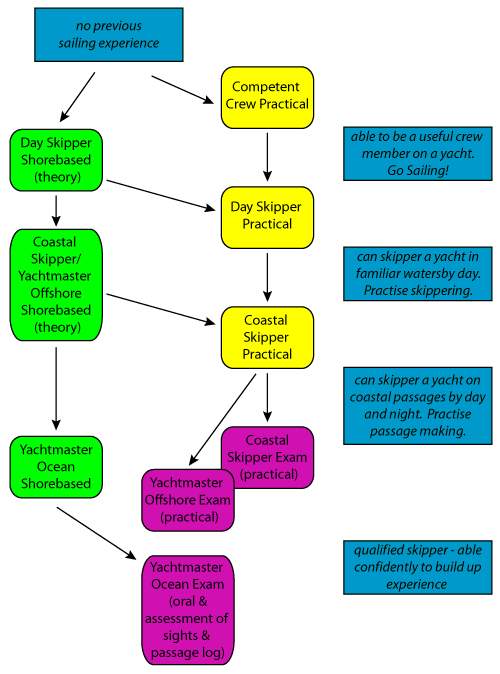The RYA Training System - Sail Cruising
Introduction
A lot of people visiting this site will be working their way through the RYA system, so it is worth looking at it and explaining how it operates in practice.
Of course, full information is available from the RYA itself (and indeed is printed in the Syllabus and Logbook). This section answers some of the questions that I am frequently asked by confused students - and which some instructors are a little reluctant to answer (e.g. because they are keen to tell you that you need to do the course they offer...).
The System
The Royal Yachting Association (RYA) has set up an effective and comprehensive system for training amateur sailors.
The courses are delivered by independent sailing schools, who are monitored by the RYA, and given RYA recognition. It's a sort of franchise system.
Other sailing bodies in the English speaking world have adopted/developed similar systems.
The system works like this:

It is useful to appreciate certain facts about this system.
- It is not compulsory, nor is it the only way to learn about seafaring. In the UK it is not necessary to possess any qualification in order to skipper a private pleasure yacht, unless you are being paid, so that is one reason why it is not compulsory.
- It was developed for, and is chiefly suited to, amateur sailing. Although the Yachtmaster ® qualification can be 'Commercially Endorsed', it was originally conceived and envisaged as an amateur qualification. (Professional qualification systems demand, for example, far more sea time).
- It is a flexible system and you can take from it what you need: i.e. you can do the courses that suit your needs, and most schools (and I) will be happy to advise you.
Example
My own example illustrates this reasonably well.
At the time when I bought Aztec, and then set out on a 12,000 mile North Atlantic Circuit, I had never undertaken a single full Practical or Shorebased course.
I had sailed at weekends, mainly during the winter months, with two or three Solent-based schools, and I had built up enough skill/knowledge/experience for them to 'sign off' all the elements of the practical courses, Day Skipper and Coastal Skipper. My theory knowledge was all pretty well self taught, and came from books and diving experience. I taught myself astro navigation from a book (in the back garden, when I was stuck at home with a broken leg).
Real learning started when I had my own boat, and every passage was a learning experience.
Before I started Aztec Sailing I needed the Yachtmaster Offshore qualification, so I took the exam after a couple of days' brushing up the essentials with Bulldog Sailing. It was relatively easy, because I was used to doing the things the examiner asked me to do - i.e. it helped that I had sailed about 15,000 miles as skipper at that stage. I went on to do the Yachtmaster Instructor course/assessment, and I was glad to discover a refreshing open-minded attitude within the RYA hierarchy. This encouraged me to apply my own (slightly unusual) skills and experience to teaching others, and was a really good start for Aztec Sailing as a Sailing School with full RYA recognition.
So the RYA system accommodated (and encouraged) someone who by no means followed the 'normal' sequence of courses.
What This Means in Practice
What this means to you, is that you can follow the classic RYA sequence of courses described in the flowchart above - and in most cases that is probably the best way of doing it, and an excellent introduction to sailing. But you don't have to.
For example: if you are good at learning stuff on your own, from books or websites like this one - OR - if you already know the stuff from other sea-faring activities, it's perfectly OK to acquire the necessary knowledge that way, and you don't need to do the shorebased courses. It's the knowledge that matters - not how you acquired it.
The other point is this: there is simply no substitute for experience.
If you do all the courses, and take the Yachtmaster exam with pretty much the minimum sea time / miles, then you may well pass it: you will then be a qualified, and extremely inexperienced, skipper. This is particularly true if you take the 'tidal' courses in places where there is barely any tide and where the weather is nice.
You can collect all the 'badges' but I, for one, would question the point of it.
The worst thing you can possibly do is to 'believe' your own qualifications when, deep down, you know that there are certain things that you have not experienced and are not prepared for. Use your judgement, and there is no shame in avoiding situations that you are not ready for (it's a mark of experience to do that). Don't set off with a Force 9 weather forecast just because a piece of paper says you are a 'Yachtmaster'!
On the other hand, as you gain experience, you can tackle larger challenges and more severe conditions which you judge to be within your capability (not forgetting the capabilities of the yacht and crew - and you generally have a 'plan B' in case you need to bottle out!). You have to learn not to be intimidated by overly cautious advice.
Another point: a huge part of a skipper's responsibility is dealing with things that go wrong with the boat. If you have just done the courses, and never run your own boat, you will probably have missed out on a whole (vitally important) side of skippering.